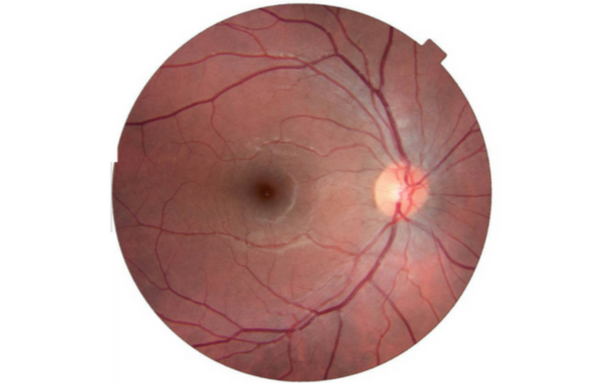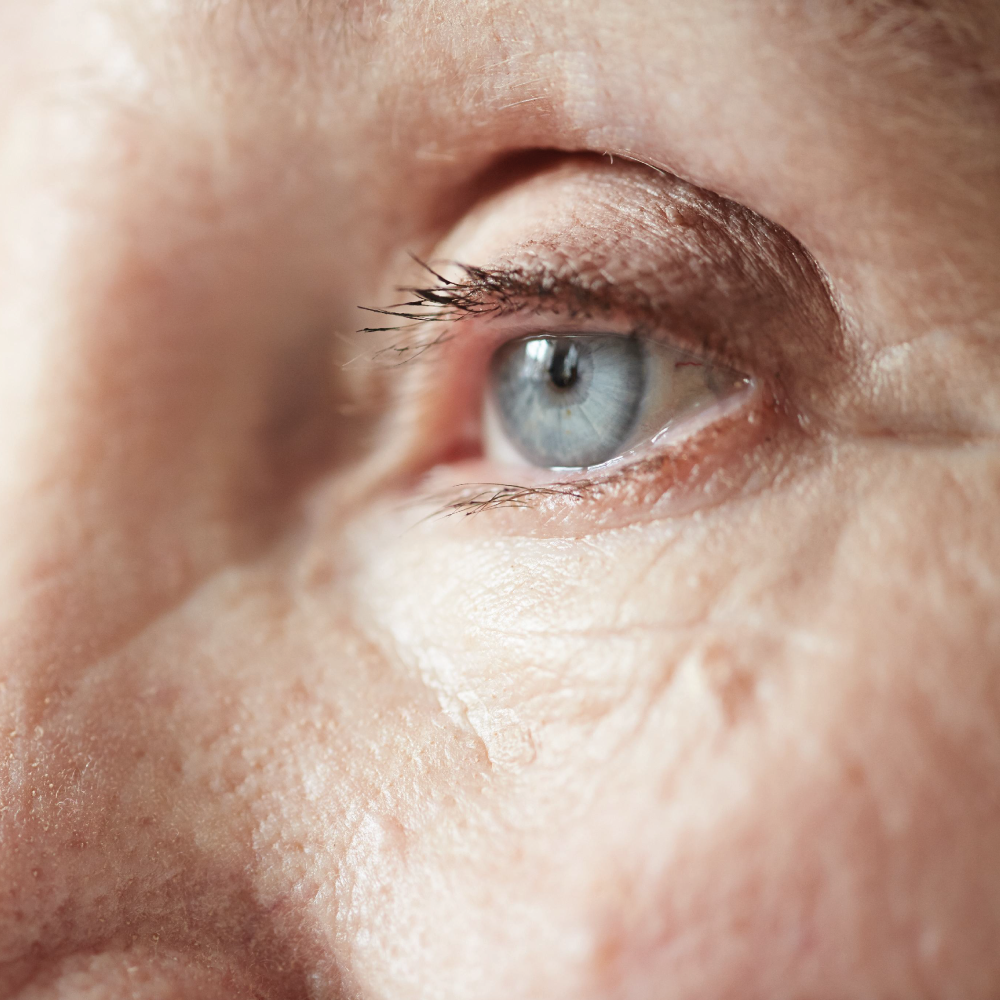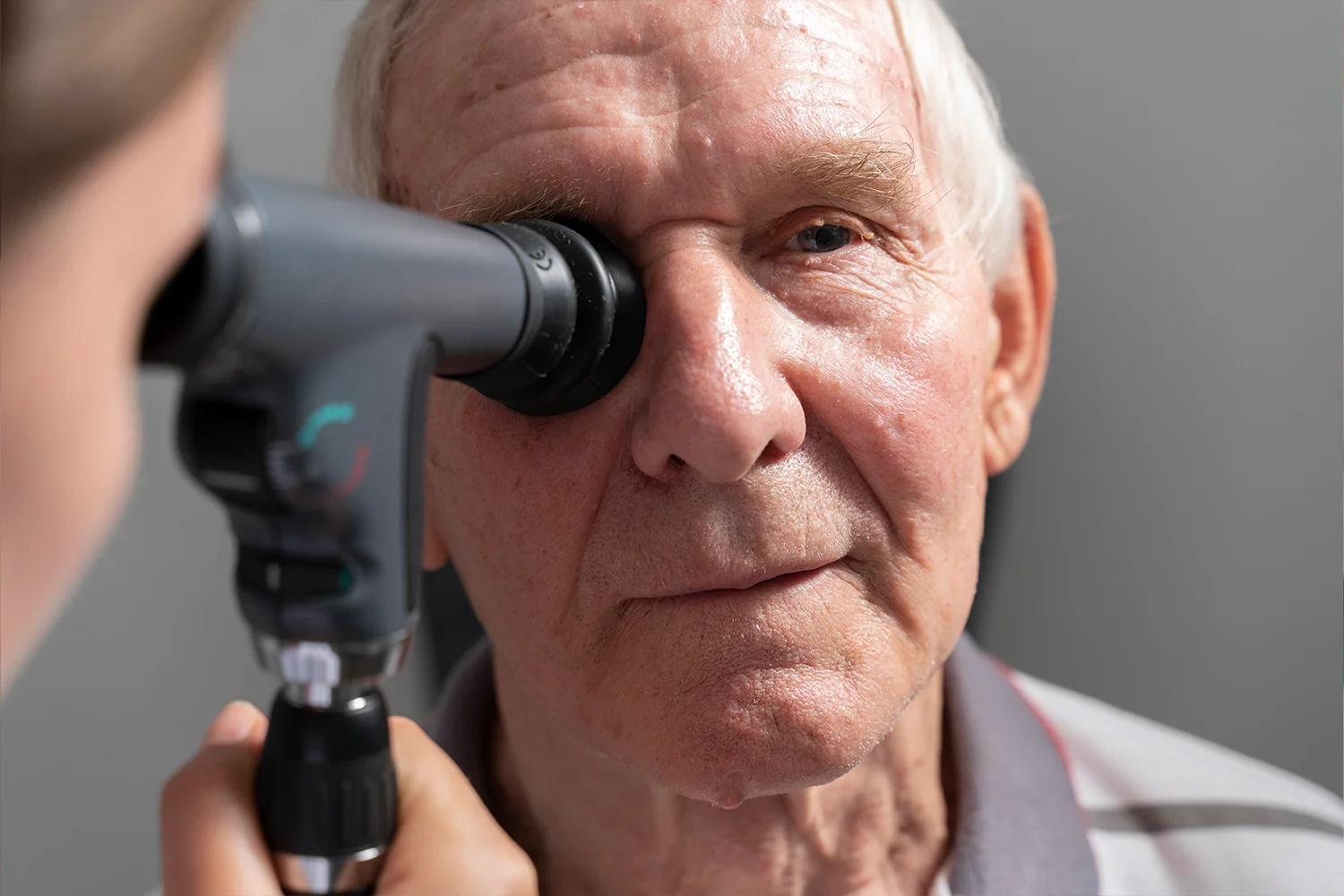Early diagnosis to protect your central vision.

Age-related macular degeneration (AMD) is a degenerative disease of the retina that primarily affects the macula, the center of vision, and is the leading cause of blindness in patients over 55 years of age.
May your memories not be erased with time.

Types of age-related macular degeneration
- Dry (Atrophic) AMD: This type of macular degeneration is caused by the accumulation of drusen, yellowish deposits beneath the retina, which causes progressive retinal atrophy. It is usually asymptomatic and predisposes to acute bleeding and central retinal atrophy. It requires periodic monitoring, and it is recommended to take antioxidants, maintain a balanced diet, reduce light exposure (in some cases with blue light filters), and not smoke.
- Wet or Bleeding AMD: The proliferation of new blood vessels that destroy central vision. The natural progression of wet AMD can cause central blindness.

Causes
Age-related macular degeneration is a genetic disease influenced primarily by four factors:
- Genetics: It is a highly prevalent hereditary disease, affecting up to 22% of Caucasians and somewhat less prevalent in pigmented races. In the United States, it is estimated that 11 million of its population of 324 million suffer blindness due to Age-Related Macular Degeneration.
- Tobacco: It is a powerful oxidant and has a very negative influence on the progression of the disease.
- Light exposure: Greater exposure to light, both natural and artificial, is associated with a higher risk of AMD progression. It is always advisable to reduce your exposure by wearing sunglasses. In intermediate and advanced cases, the use of visible and invisible blue light filters may be recommended.
- Cardiovascular disease: A diet rich in antioxidants helps protect against progression. Conversely, a diet poor in antioxidants increases the risk of disease progression.

- Blurred Vision: Decreased central vision (distance vision and reading ability are reduced)
- Distorted Vision: Straight lines appear wavy.
We care for your macula with precision and medical experience.

Treatments
There are two types of treatments for Macular Degeneration:
Intravitreal antiangiogenic (anti-VEGF) therapy is the treatment of choice for wet (bleeding) age-related macular degeneration and consists of serial injections of intraocular medication aimed at inactivating new vascular lesions. Laser treatment: Alone or in combination with intravenous medication with activity on new vascularization, such as Verteporfin, it is sometimes used to improve disease control. Surgery: In rare cases, intraocular surgery may be necessary to treat massive hemorrhages or other retinal damage.

Diagnostic Tests: OUR TECHNOLOGY
Insurers and Mutual Insurance Companies
Insurers and Mutual Insurance Companies






















































These are some of the mutual insurance companies and health insurance providers we work with. However, the agreement with these mutual insurance companies will depend on the healthcare center.
If your policy doesn’t appear on the list, please don’t hesitate to contact us for more information.
Trustindex verifica que la fuente original de la reseña sea Google. Me operé el 17/6 y estoy contentísima. Empezando por Judith, la recepcionista que tuvo conmigo una paciencia alucinante (si lees esto, gracias) y siguiendo con la doctora Saskia, como siempre tan cercana como profesional, explicandomelo todo y haciéndome sentir tranquila. Ella me explicó la operación en su día, decidí hacérmela y a día de hoy no puedo estar más contenta con su profesionalidad. Todas las mujeres que estuvieron en quirófano ese día, excelentes profesionales, lamento no haber preguntado sus nombres, me hicierion sentir muy cómoda y eso que venía nerviosa.Trustindex verifica que la fuente original de la reseña sea Google. Fantástica, la Dra.Romero es una gran profesional, ojalá fueran tod@s como ellaTrustindex verifica que la fuente original de la reseña sea Google. He acudido al doctor Maisterrena para una cirugía de un quiste y su atención ha sido muy buena, delicado con su trabajoTrustindex verifica que la fuente original de la reseña sea Google. Las visitas suelen tardar de la hora reservada, pero es normal. Están con los pacientes el tiempo necesario para dar buen servicio.Trustindex verifica que la fuente original de la reseña sea Google. Muy bien atendidoTrustindex verifica que la fuente original de la reseña sea Google. Great experience. I was received promptly and the staff as well as Dra. Marin were excellent. She took care and time to explain the outcome of the consultation and the different treatment options -- a rare luxury in healthcare these days. Thrilled to have found this practice.Trustindex verifica que la fuente original de la reseña sea Google. Trustindex verifica que la fuente original de la reseña sea Google. Acudí al doctor Maisterrena por recomendación y la experiencia no podría haber sido mejor. Desde el primer momento, me informó con todo detalle, demostrando una gran profesionalidad, seriedad y rigor. Los procedimientos que me realizó requieren una altísima especialización, y en todo momento me transmitió absoluta confianza. Su precisión y cuidado son impecables. Sin duda, un profesional de primer nivel.Trustindex verifica que la fuente original de la reseña sea Google. Trustindex verifica que la fuente original de la reseña sea Google. Excelente trato por parte del Dr Maisterrena. Me hice un tratamiento estético: él escucha tus necesidades y te aconseja lo mejor!La evaluación general en Google es 4.2 de 5, en base a 58 reseñas


